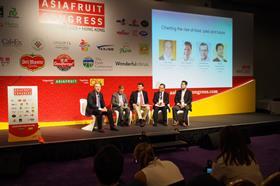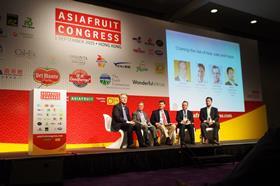

Delegates at Asiafruit Congress have heard how Asia’s economic resilience and fondness for high quality fresh fruit will continue to drive growth within the region’s import sector.
The conference began with a panel of industry authorities looking back on changes within the trade over the past 20 years and projecting market demand over the next decade.
Asiafruit Magazine editor John Hey helped frame the panel discussion through a presentation based on the results of a recent survey untaken by the publication, which involved a number of high-powered leading industry figures reflecting on the industry’s growth over the last 20 years. During his presentation, Hey touched on four key macro changes that the survey had uncovered, including China’s rise as a trade force, the removal of trade barriers in the region and the emergence of modern retail in Asia.
Hey also cited Asia’s economic rise over the last two decades, highlighting that consumers, importers and suppliers from the Far East were relatively immune to the impacts of the recent global financial crisis.
Panellist John Piper, founder of Hong Kong-based Food Asia Marketing, agreed with Hey, suggesting the fruit trade will continue to grow despite concerns about an economic slow-down within Asia. 'Despite previous global economic blimps Asia has seemed to sail through,” Piper explained. “In Asia fruit is a luxury item, a luxury item that people can afford and will continue to pay for.”
Piper was joined on stage by Nick Kukulan, president of Paramount Export Company; Geoff Green, head of Capespan General Procurement; and Eric Li, vice-president of Shanghai Yiguo E-Commerce.
Green highlighted how Asian markets have become increasingly attractive to Southern Hemisphere suppliers, whose counter seasonal programmes have help fill gaps in local production. “In South Africa, the only thing on growers minds is Asia,” Green explained. “While Europe remains an important market for South African suppliers, growers are no longer planting varieties with appeal in Europe.”
Li spoke about the evolution of the e-commerce trade in the fresh produce industry, particularly in China. He said interest in the e-commerce sector had risen sharply over recent years, however, it was too early to gauge what role it will play in China’s retail landscape. “E-commerce (for fresh produce) has become very competitive over the last two years, with all the major players wanting to enter,” Li said. “So far we are seeing high volumes of repeat purchases from consumers, which shows we are heading on the right track. It is a marathon though and too early to make a call on exactly how big it will grow.”
At the conclusion of the session, Piper stressed that the challenge over the next 20 years would not be to grow the market for fresh produce imports in Asia, but rather assuring that supply maintains pace with demand. “I have no doubt that the demand will continue to be there, the question is where is the production going to come from and how will it get in?”



